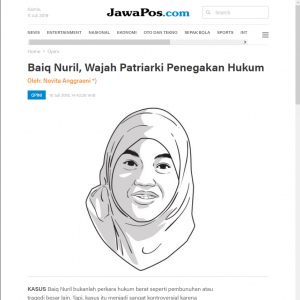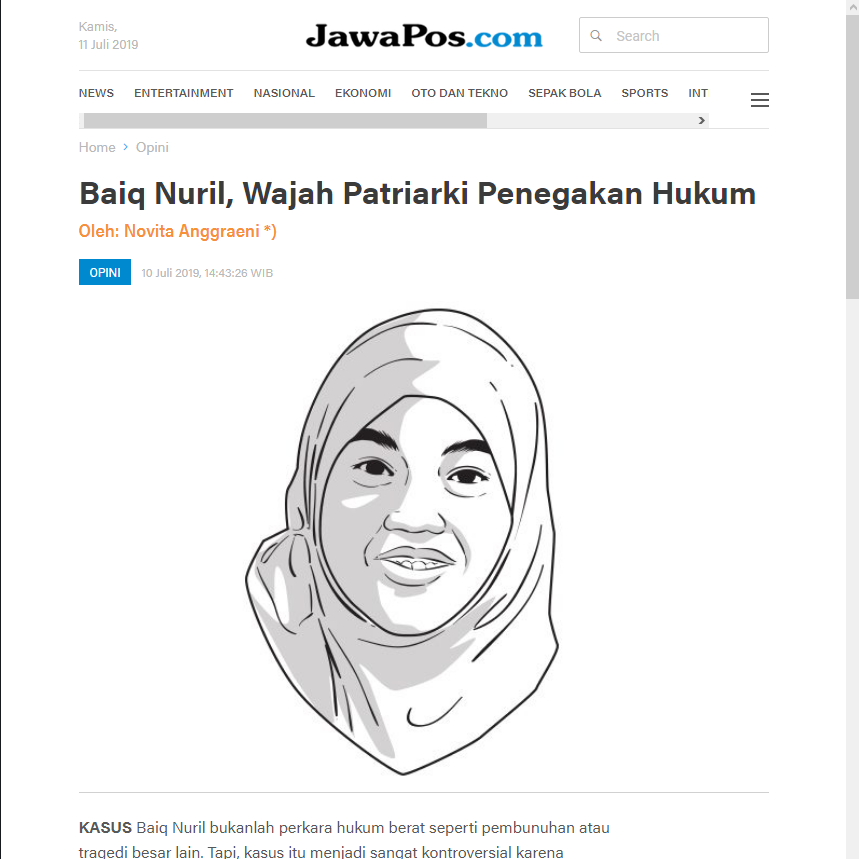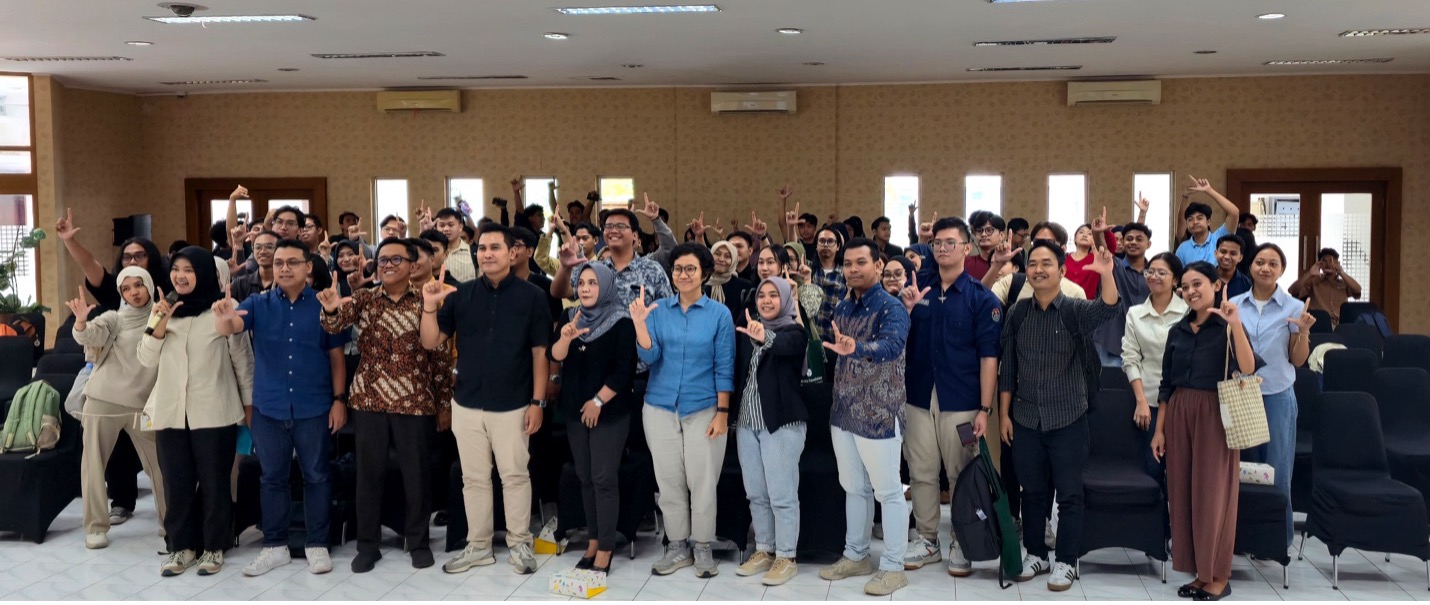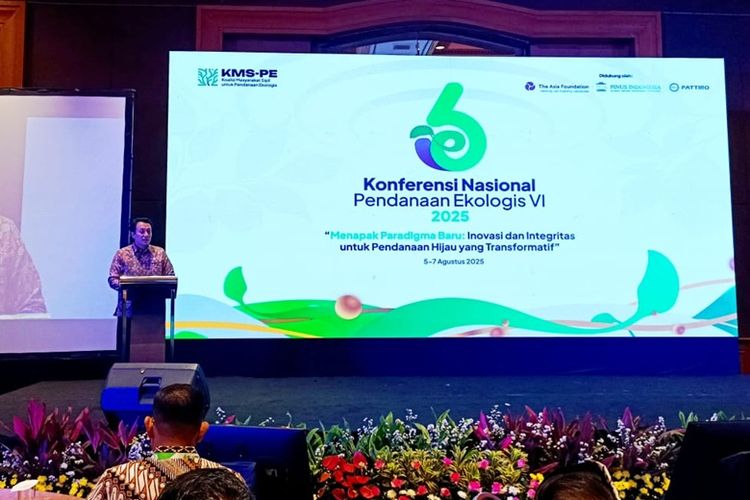 By: Novita Anggraeni *)
By: Novita Anggraeni *)
CASE Baiq Nuril is not a serious legal case like murder or other major tragedies. However, the case became very controversial because it set a bad precedent for victims of sexual harassment. In this case, victim blaming or blaming the victim does not only occur at the community level and does not stop at isolating the victim. But it also resulted in a guilty verdict for the victim in a defamation complaint against the alleged abuser.
The appeal attempt which was rejected by the Supreme Court (MA) again reminds how the law and authorities view cases of sexual harassment against women. The latest development is that Baiq Nuril even had to ask the president for help in efforts to free himself.
The case began when an honorary teacher named Baiq Nuril felt uncomfortable because he often received verbal sexual harassment from the principal of the school where he worked. Due to his weak position, he did not dare to frontally resist or stop the harassment. Then, he finds a way to make the principal quit. Namely, recording inappropriate conversations made by the perpetrator via telephone. Nuril took this step as an effort to defend himself so that the harassment did not continue. Unfortunately, the recording was leaked because a colleague distributed it without permission.
When the case emerged, no one suspected that in the process the perpetrator would succeed in turning the situation around by making the victim a suspect.
Sexual harassment should not be the victim’s shame, but rather the perpetrator’s. However, often when such cases are exposed, the backlash against the victim becomes greater. Both from the perpetrator, the perpetrator’s family, the victim’s family, even the surrounding environment. As a result, the victim experiences pressure and becomes a victim a second time.
Patriarchal culture is considered to be one of the roots of condemnation of perpetrators of harassment against women. Considering that the honor of men who are perpetrators must be protected more importantly than female victims whose honor is actually violated. Sexual predators happily carry out their passions because they know that a patriarchal society and neglectful authorities actually provide protection for their actions in the form of excuses and omissions.
The case of rejecting Baiq Nuril’s cassation seems to be a statement for all victims of harassment to keep their mouths shut and not report it or they will be charged with defamation. Especially if the perpetrator is a person who has power. Ignoring the facts about the purpose of recording harassment as a self-defense strategy and disseminating content that was not carried out by the victim shows the perspective of our law enforcement officials towards sexual harassment. The attorney general’s statement that Baiq Nuril was not a victim of harassment and that the decision was in accordance with the provisions of the Information and Electronic Transactions (ITE) Law is a reflection of the gender bias behind the rejection decision. Law enforcement’s poor understanding of victims and neglect results in decisions that are far from justice.
Attitudes of Society and the State
The case of sexual harassment and victim blaming towards Baiq Nuril has become a dark series of poor handling of harassment cases, both before the law, government institutions, and even educational institutions such as campuses or schools.
Often victims who try to seek justice receive brutal treatment from their environment and family. For example, the Agni case on the Gadjah Mada University (UGM) campus, the case of harassment by one of the BPJS officials, the case of harassment of several female students by lecturers at UIN Bandung, and many other cases whose resolutions often do not favor the interests of the victims.
In fact, in cases that are exposed and receive public scrutiny, such as these cases, the victims still do not get the justice they hope for. Because, often the majority of those in charge of upholding justice still have a gender-biased perspective, which influences the search for justice. If examined further, many similar cases are only half-heartedly investigated, ignoring the rights and perspectives of victims by always offering “amicable” solutions without listening to the victims’ wishes.
Cases of sexual harassment and violence recorded at the National Commission on Violence Against Women show a significant upward trend. In 2014, 4,475 cases of violence were recorded. That number increased to 6,499 cases in 2015. Then, in 2016, there were 5,785 cases. A different perspective must be used in looking at cases of sexual violence and harassment against women compared to other criminal cases.
The more case numbers show a positive side, it means that more victims have the courage to report it. As is known, violence and harassment are the tip of the iceberg. Most victims are reluctant to report or seek justice because they consider it a disgrace. Against the background of the victim’s psychological condition and a strong patriarchal culture, the victim will be more vulnerable if the case is exposed.
Law enforcers who still have gender bias and case handling mechanisms often add to victims’ trauma or make victims vulnerable to discrimination and negative stigma.
Regarding this situation, a serious breakthrough is needed to end the terror against victims of sexual harassment and violence who are trying to seek justice. Synergy between state institutions such as the Attorney General’s Office, the National Commission on Violence Against Women, the Ministry of Women’s Empowerment and Child Protection, and the police absolutely must be implemented. Building a gender-responsive justice enforcement perspective by implementing gender mainstreaming in law enforcement, especially in cases of sexual harassment and violence, is urgent to do immediately.
Develop mechanisms for handling sexual violence and harassment with a gender perspective to become part of the operational standards of public institutions and provide education to all parties, including law enforcement officers and the general public.
Maybe all these steps and efforts will not immediately eliminate the existing problem. However, at a minimum the state responds and facilitates protection for one of the most vulnerable groups in cases that harm a nation’s sense of justice. (*)
source : https://www.jawapos.com/opini/10/07/2019/baiq-nuril-wajah-patriarki-penegakan-hukum/





